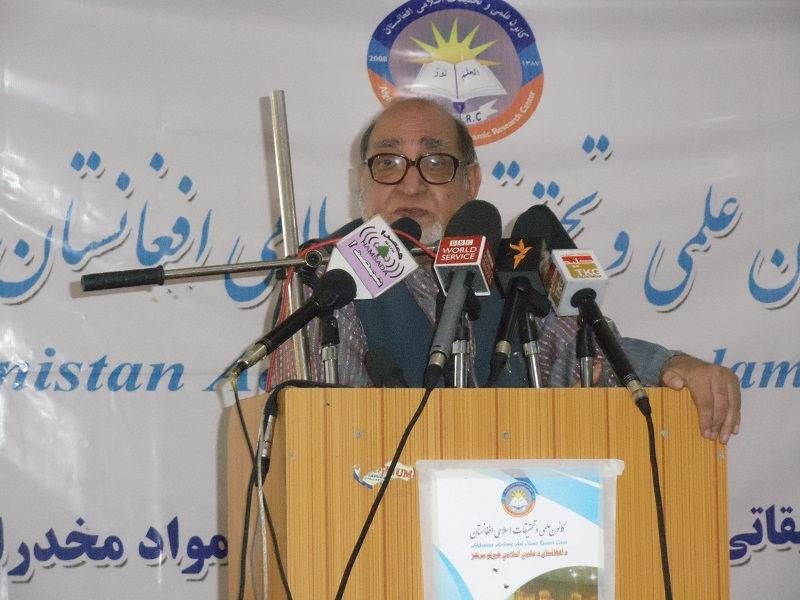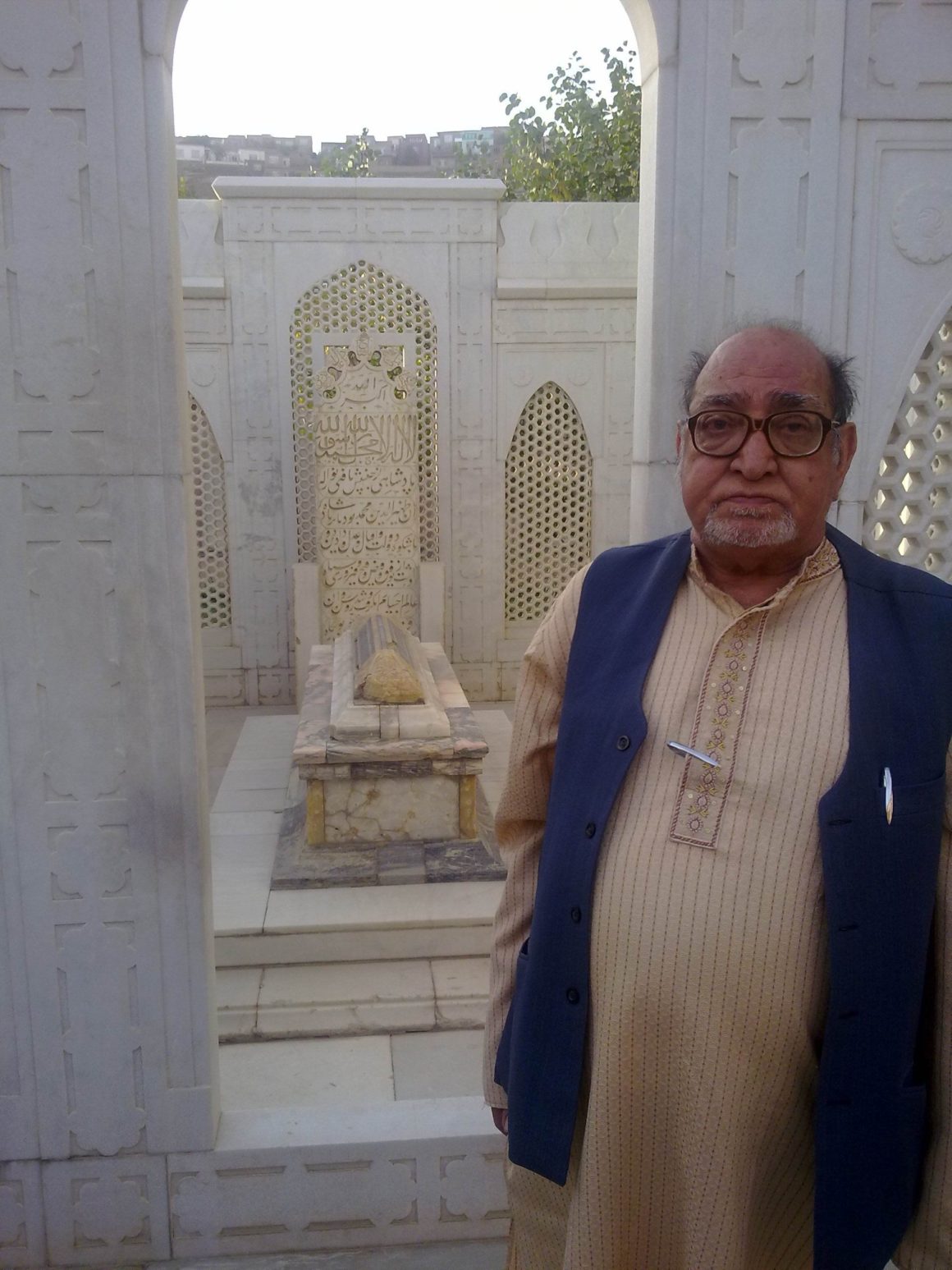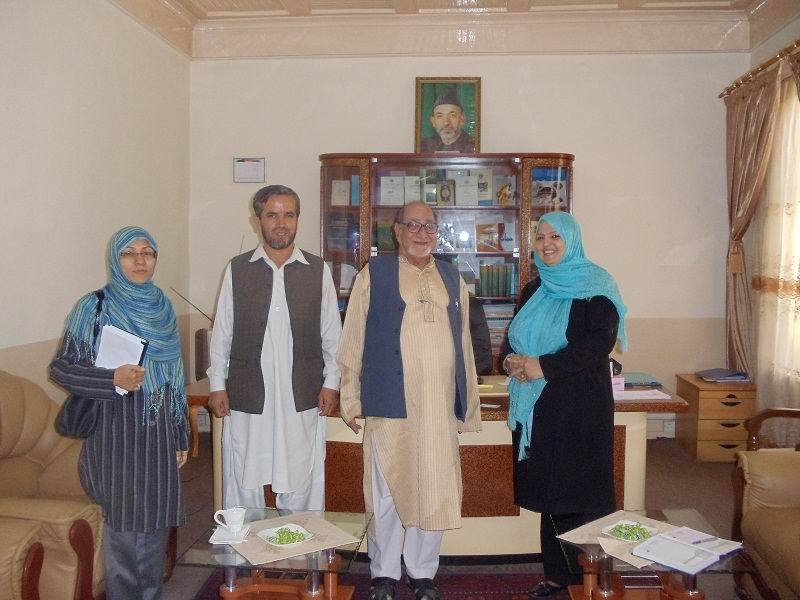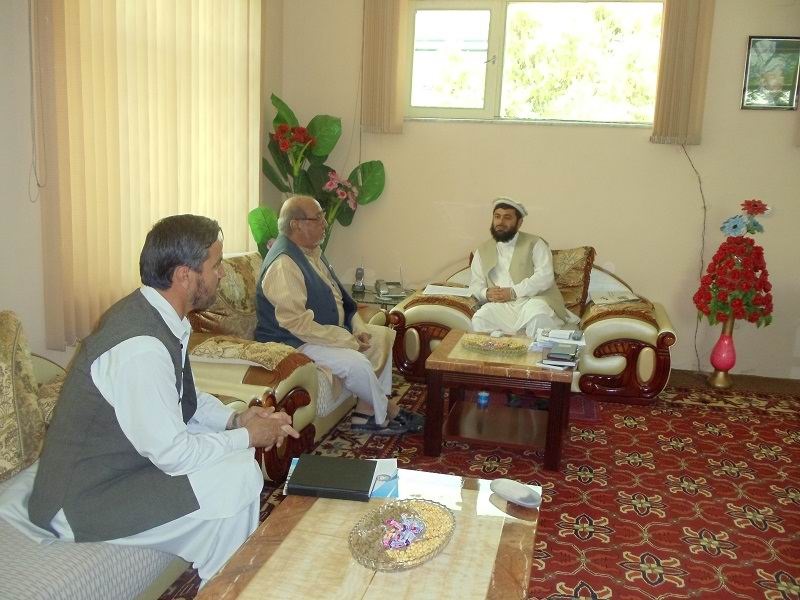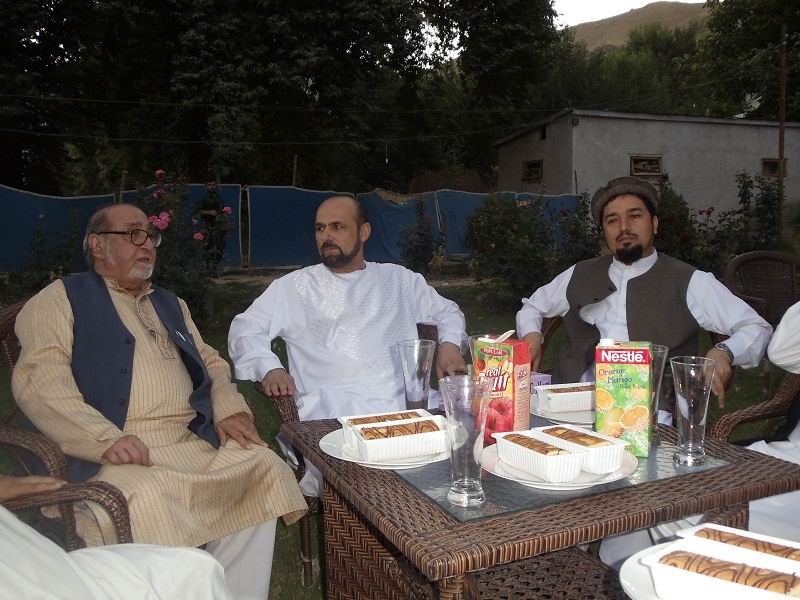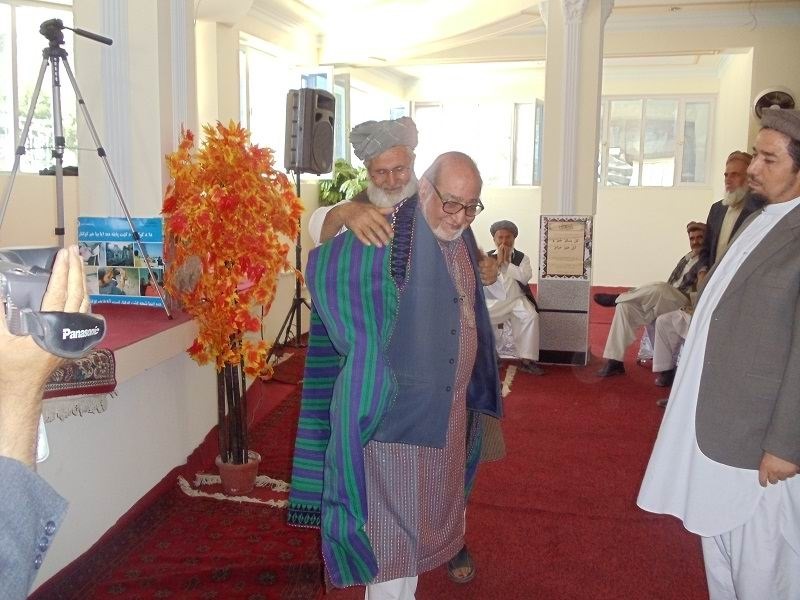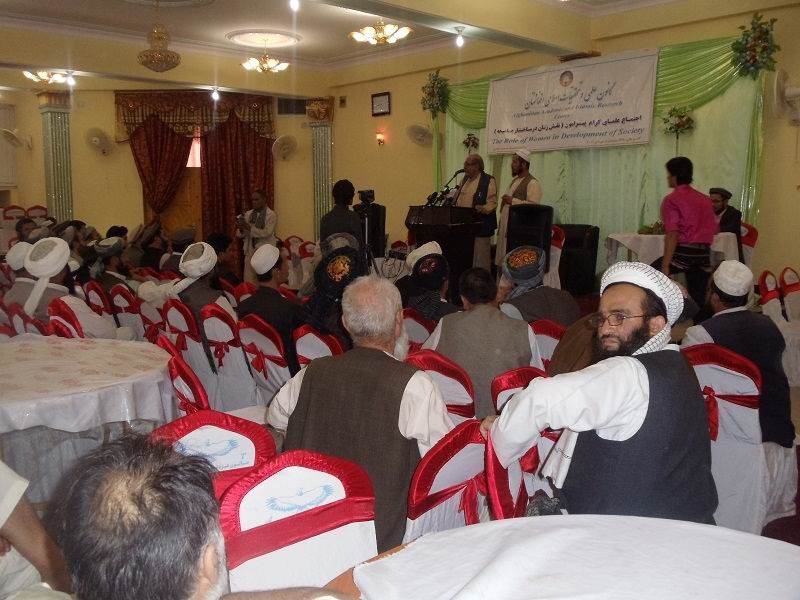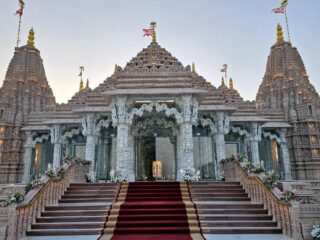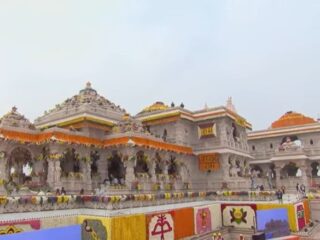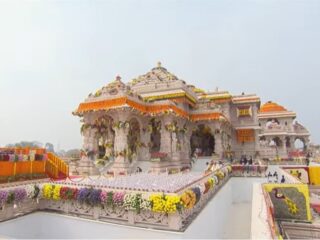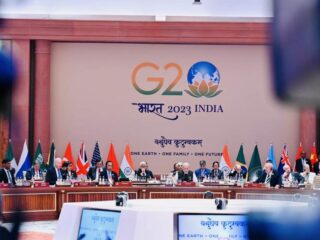Asghar Ali Engineer
(Secular Perspective, July 16 to August 15, 2011)
I got an invitation for a week’s visit from Mawlawi Ataurrehman Saleem of Afghanistan Academic and Islamic Research Centre, a premier organization of Afghanistan on Islamic issues. Though I have been all over the world but had never visited Afghanistan and hence accepted the invitation for a weeklong visit. I proposed dates and finally fixed 1-7 July for my visit. I also had invitation for a week long visit from Iran from 23rd to 30th June but to visit two countries, one after the other, was rather difficult for me at my age and hence preferred to go to Afghanistan.
This Islamic Research Centre in Kabul headed by Mawlawi Ataurrehman Saleem has support of 300 Ulama and its primary purpose is to spread moderate and enlightening thoughts about Islam and hence have drawn up programme to invite prominent Ulama from different countries to interact with these ulama and also Government authorities. Ataurrehman himself is a man of vision and is working hard to spread moderate Islam. It is his mission.
I had, like many others, certain wrong notions about Afghanistan. It is only my personal visit that I came to know reality about this troubled and much talked about country. It has gone through many trials and tribulations since late seventies and is still facing formidable challenges. Thanks to media reports we all think that whole of Afghanistan is experiencing violence and there is no peace or governance outside Kabul.
All the friends and family members who came to know that I propose to visit Afghanistan earnestly pleaded with me not to do so as I will not be safe and some wished me safe return and advised me to take all possible precaution. But I discovered on my visit that Afghanistan except some parts near Pakistan border is as safe as India and one can roam freely right up to Badakhshan which has common border with Tajikistan, Uzbekistan and China. Maulana Ubeidullah Sindhi and his companions had crossed into Uzbekistan, (Soviet Union) through Badakhshan during freedom struggle and then went onward to Moscow and met Lenin in early twenties.
I reached Kabul via Delhi on 1st July which was Friday. In Afghanistan weekly off is on Friday and hence everything was closed and I had a day of rest. Next Day I met Mawlawi Ataurrehman Saleem in his office, very close to the guest house I was staying in. The Mawlawi knew Urdu and conversed with me in Urdu. Many people in Afghanistan who visit India or Pakistan manage to speak in Urdu.
Though there are many linguistic groups in Afghanistan, it is largely bilingual country. Pashtu and Dari (Persian) are official languages. Since I know Persian (though I cannot speak it) I could easily understand all that was written in various places, on signboards etc. On airport all directions were written in Persian which was pleasant surprise to me I thought it would be all in Pashtu. Most of the Afghan people manage to speak both the languages. Persian is the language of learned and cultured people. Most of the Ulama are fluent in Persian language.
I had a long discussion with Ataurrehman about the situation in Afghanistan including the religious aspects. He told me that except few districts bordering Pakistan, especially near Jalalabad, Taliban have no control in Afghanistan and even in those districts they attack and disappear. They do not actually control governance in those districts. Taliban are more a media creation than a reality.
It is interesting to note that Afghan people generally consider Pakistan as their enemy. Mawlawi sahib also told me that Pakistan is our enemy number one. It wants to dominate Afghanistan for its own selfish interests. The Taliban problem is mainly because of Pakistan. It trains them and sends them to our country. India is our friend. This was corroborated by many other Afghans. So much for those who maintain that Islam unites. It is interests which unite or divide, not religion.
He also told me that though there are Sunnis and Shias, different linguistic groups, different tribes etc but they are all united. There is no internal conflict between these groups. Ataurrehman was all praise for Shah Ahmad Masoud who was in control of Northern provinces right up to Badakhshan. He was a charismatic leader who could unite all Afghan people. That is why Taliban killed him.
Even today, according to him, Shah Ahmed Masoud is highly respected. I also saw his portraits and photographs everywhere in Northern provinces on my way to Badakhshan. We passed through about 7 provinces on our way to Badakhshan but there were no signs of any fighting or violence. All these areas were completely peaceful and we could freely pass through them without any security arrangement. More about it later.
Mawlawi Ataurrehman had arranged visit to some relevant ministers and advisor to the President. I was expecting strict security checks while going to meet these officials.
However, to my great surprise nothing of the kind happened. That itself shows that situation is quite relaxed. First of all I met Mr. Muhammad Ashraf Rasuli, Chief Advisor to the President of Afghanistan. It was more of a courtesy visit.
He too had very favourable opinion about India and its relations with Afghanistan. I told him about Muslims in India, their problems as well as democratic rights they enjoy. I also told him that Muslims in general are quite poor and backward and also told him that the Government of India had appointed Sachar Committee to assess extent of poverty, backwardness and illiteracy and now is taking certain steps on the basis of recommendations of the Commission.
Next evening we visited Babur’s tomb which is known as Bagh-e-Babar with Mohammad Afzal Afzali who speaks English fluently and works in Ataurrehman Saleem’s office and his friend Ahmed who is head of an NGO and also knows English quite well. Babar’s remains were brought to Kabul several years after his death in Agra. Though its grandeur is not comparable with Moghul buildings in India, it is beautiful place to visit. One has to walk almost a km. from entrance to the tomb which is on top of a hill. Shahjahan when he visited the tomb also built a mosque of marble near the tomb. The tomb was in bad shape but Agha Khan Foundation restored to its original design. It is very close to the city and many Kabulians come there for picnic.
I met Syeda Mostafavi, the Deputy Minister Women affairs. She is very committed to women’s cause. I talk to her about situation of women in Afghanistan which is rather worrisome. She says it is all on account of our narrow minded mullahs and maulavis. We are to great extent helpless. They have larger than life influence on people of Afghanistan. Government is committed to improving women’s situation but first we have to change the mindset of these maulavis.
I tell her about creating awareness among women by conducting workshop on their Qur’anic rights and I told her that I conduct such workshops regularly in India and it has produced good results. Creating awareness among women is perhaps more productive than changing orientation of theologians. She agrees with me and says we can sponsor few women for your workshops in India. But, our workshops are in Urdu/Hindi and women in Afghanistan speak Persian/Pashtu. Yes, but we can arrange for translation into Persian. I welcome the proposal.
The situation of women in Afghanistan is indeed worrisome and believe me it is not only on account of Taliban. Taliban is only one factor among many and as pointed out above, Taliban are not all over. The Government is opening schools and educating them and I saw schools in almost all villages when we passed through several provinces. The situation of women is bad because of widespread illiteracy, very low level of awareness about their own rights and undue influence of extremely backward Ulama.
What is more shocking to many, though not all, women justify their low social status due to Qur’an and hadith. One women, who was in charge of Government programmes for women in province of Badakhshan, told me that Ulama tell us that we are naqis al-‘aql and naqis al-Iman (our reasoning power and our faith is weak and defective) and it is written so in Qur’an.
I told her no such thing is written in Qur’an. On the contrary entire discourse about women is right-based in Qur’an and entire discourse about men is duty-based in Qur’an. Again the main problem was communication as this woman officer knew very little English and I very little spoken Persian. But I could very well make out how little women knew about their own Qur’anic status.
One sees women outside Kabul totally wrapped in burqa’ from head to toe and their eyes also cannot be seen. Only in Kabul one sees some women with faces open. Middle class educated women in cities like Kabul may not so cover themselves but they too cover head which of course is quite dignified. I also met the head of Women’s Voice Radio in Kabul. She works for women’s rights and the radio is used to create awareness for women’s rights. She also complaints about the attitude of Ulama and holds them responsible for women’s low status in society. Various programmes for empowerment of women are broadcast on the radio.
I also met Deputy Minister of Wakf and Haj Affairs Mawlawi Abdul Hakim Munib, who was former minister in Taliban Government. However, he left Taliban and joined the Karzai Government as Deputy Minister. I was warned about his Taliban background and to be cautious in talking to him. However, the way he talked to me did not give an impression that he is conservative. At least he posed before me to be open-minded and critical of Taliban.
I asked him how many people go on Haj from Afghanistan every year. He said around 30,000. I told him from India about one lakh (100,000) people go on Haj though it is non-Muslim country. I also told him that Government of India gives subsidy towards cost of travel and looks after arrangements for stay of hajis. He was surprised that why government should pay subsidy for haj? It is religious obligation for Muslims and only those who can afford should go. Any government, Muslim or non-Muslim, should have nothing to do with individual religious obligation of Muslims.
I told him I am also of the same view but for last several years it is being given by Indian Government and now it is very difficult to withdraw it. I explained to him the reason why subsidy was introduced. Earlier Muslims were going to haj by ship which cost much less but the Moghul Lines Shipping Co. went broke and discontinued its services. The only alternative was travel by airline which ordinary Muslims could not afford and hence Government decided to subsidise it and now politically it is very sensitive matter and even BJP, a rightwing Hindu party also could not discontinue it. In fact it also increased the quota of hajis.
We also discussed the law for Waqf properties and huge number of Wakf properties in India which, unfortunately, are not properly managed and Muslims cannot derive maximum benefit from it. If these properties are efficiently managed and corruption removed, illiteracy and poverty among Muslims could be minimized. The problems of Wakf are very different in Afghanistan. It is a Muslim country but he complaints our Ulama are quite narrow-minded and do not allow scope of Wakf properties to be expanded. I tell him about widespread illiteracy among women in Afghanistan. He agrees but again shifts blame on ulama.
Next day we start for Badakhshan where main conference on “Islam and Narcotics” is to take place on 6th July. Badakhshan is the northern most province facing menace of poppy cultivation. Badakhshan is more than 600 kms away from Kabul and one has to pass though five provinces and the whole way is surrounded by beautiful majestic mountains. We started our journey by two vehicles and five-six ulama headed by Mawlawi Ataurrehman.
We started at 4 a.m. In Afghanistan daybreak is very early. By 4 a.m. it is broad day light and by 5 a.m. one sees Kabul roads thriving with activities and people going on work. We stopped for breakfast on the way by the side of a river in the lap of mountains. It is a beautiful sight. Hot seekh kabab and fish are served along with green tea for breakfast. It seems eggs are not generally served in breakfast. Cheese and honey are quite popular for breakfast. Surprisingly in a tradition bound country like Afghanistan drinks like Cocoa Cola, 7-up etc. are very popular and are widely consumed. This is impact of American culture. We accept such changes easily but resist any change as far as women’s liberation is concerned.
On the way we had to stop at a district place to address ulama on women’s rights in Islam and also have lunch. There were about 70-80 ulama from that district. After lunch my speech began. First it was decided that I should speak in English and a translator was also found to translate my speech. However, it was decided that I should speak in Urdu as many Ulama understand Urdu a little and of course it would be translated into Persian by an alim who knew Urdu well.
I spoke on rights of women and quoted many verses from Qur’an to show gender equality and also said that entire discourse on women in Qur’an is right based and entire discourse about men is duty based and also said that contrary to what is believed that women are naqis al-‘aql and naqis al-iman (defective in reasoning and lesser in faith) women are in possession of same faculty of reasoning and have equally sound faith as men, perhaps more. This is merely cultural belief and have nothing to do with Qur’an.
This upset some ulama and became restless to reply to me. One ‘alim came on stage and made emotional speech and accused me of being ignorant of Qurr’an and hadith. I was advised not to reply and instead Mawlawi Ataurrehman came and spoke and told the ‘alim that you have misunderstood Dr. Engineer. Later on many younger ulama came to me and told me we agree with you and believe in gender equality. It gave me relief that there are some Ulama who accept gender equality.
We reached Badakhshan around 6 p.m. after a long and tiring road journey. We straight headed to Governor’s House as he had invited us to a cup of tea. His bungalow is situated on a hillock with a lush garden. His name was Shah Waliyullah which is also a name of great Islamic thinker of 18th century India He came out to greet us and I told him we have great Islamic thinker from India called Shah Waliyullah. He was very pleased. He has done his post-graduation from Khartum University, Sudan in Business Management and speaks fluent English.
We discussed narcotics problem in Badakhshan district. He said we are following both policy of persuasion as well as punishment. We try to persuade the cultivators not to cultivate crop of poppies and if they do, we go and destroy the entire crop. He also gave me statistics of drug addicts in Afghanistan. About six million drug edicts are there of which about twenty-five percent are women. This surprised me as it is, by any account, very high percentage of drug consumption among women in a highly conservative country like Afghanistan where women live under stringent control.
I had no time to investigate but perhaps such stringent controls lead to depression and consequent addiction to narcotics. Some women I talked to appeared to be quite intelligent and talented and yet they face such stringent controls. This would certainly lead to depression and consequent problems. The Governor told me that Taliban make billions from narcotic business and finance their war from this income apart from pocketing large amount of money.
Next day the conference on “Islam and Narcotics” began around 10 a.m. There were about 300 Ulama from Badakhshan and other nearby districts. I was the chief guest. Few papers were presented by some ulama which were quite scholarly and comprehensive. Two of these papers were quite comprehensive and very well written. These papers will be published and I have suggested that they be translated into other languages like Urdu, Pashtu and English. These papers were written in Persian.
I spoke in Urdu ex-tempore as I had no time to write a paper. First I tried to remove the confusion that only liquor has been prohibited in Qur’an. In fact all that produces inebriation are haram (prohibited) including narcotics. Liqour is called khamr in Arabic and which means something that covers. Liquor thus is called khamr as it covers up our understanding and reason. A piece of cloth is also called khimar as it covers our body.
Narcotics also produces inebriation and hence is khamr. Liquor is called umm al-khaba’is i.e. mother of all evils and Qur’an asks us to refrain from it. There was no problem of narcotics when Qur’an was being revealed but one can, through analogical reasoning (in shari’ah formulation analogy has been widely used and in fact, is one of the sources of shari’ah law), can easily conclude that narcotics are as much haram as alcoholic drinks.
In fact all over world (except some Islamic countries) alcohol is openly sold and marketed whereas narcotics are strictly prohibited and its possession even punished severely, even through death in countries like Singapore, Malaysia etc. No such punishment is given for drinking alcohol. It clearly shows that narcotic drugs are far more harmful than alcohol.
Also there is debate among some theologians that production of drugs is not sin though its consumption is. How can it be? All theologians and jurists of Islam agree that one should keep away from production and sale of liquor. Same will apply for drugs too. If it is haram its production and sale is equally haram. I also emphasized that one must go to the roots of the problem as to why people, especially young people consume drugs and it is very shocking that even large number of women consume drugs in Afghanistan.
There are socio-economic problems excessive traditional controls and strict enforcement of traditions also leads to frustration and consumption of drugs. This requires separate debate. Lastly I emphasized the constructive and creative role of ulama in preventing consumption of drugs. Ulama in Afghanistan are highly influential and they have ready audience in the mosque. They must exhort the youth through khutba (sermon) on Juma’a and similar other Islamic fora to refrain from consumption of drugs.
My views were quite appreciated by the ulama and they requested me to visit again and help them in this mission. I was also presented with robe of honour which is presented to guest of honour and an alim (theologian).
****
——————————————————-
Centre for Study of Society and Secularism
Mumbai.

